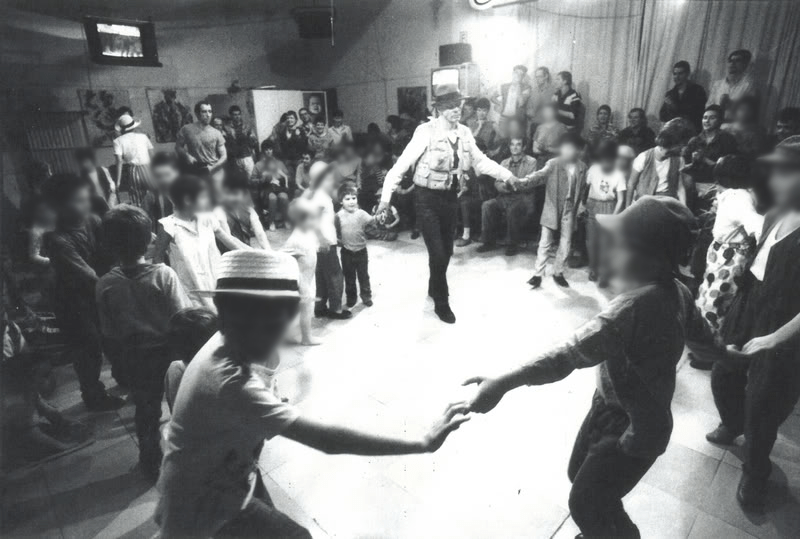Broadly is a women’s interest channel coming soon from VICE. Follow us on Twitter, Facebook, and Instagram.
Videos by VICE
WitchsFest 2015 is, in many ways, a typical New York street fair. This weekend, vendors lined the sidewalk; passersby pointedly avoided eye contact with people handing out brochures for various goods and services; and a young girl in a tiara wove through crowds giddily attempting, as she explained to her mom, to photobomb strangers. In other ways, though, it wasn’t your standard street fair—the vendors were selling fairy dust, tarot card readings, and sensual steampunk garments; the brochures were for stores that specialize in yoga and healing crystals; and several of the tiara-ed child’s photobomb victims were wearing elf ears.
WitchsFest, which is organized by the Wiccan Family Temple, is billed as a pagan street faire-slash-fundraiser. This was its fourth year of existence, though the third nearly didn’t happen—in 2014, the local community tried to cancel the event, claiming it didn’t have enough of a connection to the neighborhood. But the Wiccan Family Temple prevailed, as witches are wont to do, and the fest this year went on without any resistance.
The crowd looked exactly as you’d expect a crowd of polite pagans to: Near the corner of Lafayette and Astor Place, a woman swathed in pink gauze was holding a lecture on goddess worship. About a block away, two members of the Brooklyn–Queens Ecumenical Pagan Fellowship explained their relationship with the divine to an inquisitive young man in a polo shirt. And, across the street, a woman in a witch hat filmed a small choir of madrigal singers in assorted mythological accessories.
Like basically every milliennial woman who didn’t fit in in high school, I strongly identify with witches. I like that they wear all black; I like that they are powerful and self-sufficient; I smiled and nodded approvingly when I read that the whole riding-on-brooms rumor originates from the fact that they would take hallucinogens vaginally by putting them on the end of a broomstick. I especially like that witches are threatening to a male-dominated society, which is a tradition many of WitchsFest attendees continue to honor.
“This planet has been male-dominated for too long,” said a man clad in a headdress and sunglasses and clutching an ankh scepter. With his wife—the aforementioned woman wrapped in pink—he runs the Network for the Realization of the Goddess , a Dianic spirituality circle devoted to “helping women find and nurture that direct connection with the spark of the Divine Feminine inside of us” through meditation and guided discussion. (He gave me a pamphlet.) “Now we’re ready for energies to be balanced again, both male and female,” he added before bowing the ankh scepter in blessing.
The madrigal singers—a choir from Kalamazoo called the Bell Book and Canto—have a less spiritual, but arguably equally effective, way of achieving that gender balance. “All the good drinking songs and wenching songs are written for men,” lamented their group leader, Jennifer Jones. “We, as women, like to drink and get drunk and do stupid stuff, and so we believe that we ought to have music that reflects that.” In 2016, thus, Bell Book and Canto is coming out with an album called Poor Life Choices. One song, “I Came to Faire,” details the story of a woman who returns to a renaissance faire—having gotten blackout drunk and subsequently pregnant the previous year—in order to determine the father’s identity. Another, “Big Little Problem,” tells of a woman who “breaks up with her lord because he’s not well enough endowed for her,” as Jones gently (and mirthfully) put it.
One stall away, I spoke to two women who participate in annual Maenad rituals—an orgiastic ritual to Dionysus, conducted away from the presence of men. “We do the Maenad ritual for Ostara, which is in the beginning of the pagan year,” explained a woman named Natalie who was wearing feathered wings. “This one time of the year, [the women involved in the ritual] would be able to go into the woods [and] take off most of their clothes. They’d have ecstatic dance and trance, and they’d eat poisonous herbs and berries and, you know, trip out. When they’d get a little hungry, they’d just catch animals, rip them open, and eat them raw.”
“We don’t do that stuff,” she added. “That’s just what the ritual’s based on: that concept of being able to let go of all of your responsibility and chains.” (But really, even with the tearing apart of live animals, the Maenad ritual does sound sort of like Coachella—especially since the women involved choose to wear “ripped-up tutus.”)
The idea of sincerely practicing witchcraft isn’t something many would take seriously—Wicca still struggles for mainstream acceptance in a lot of ways. However, I was struck by how thoughtful many of the people I interviewed were. When I asked one of the representatives from the Brooklyn–Queens Ecumenical Pagan Fellowship whether he really believes in pagan deities, he responded, “My relationship with my gods is very centered on Plato and his idea of the universe being this unknowable thing; really, all that matters is my relationship to it. I guess you could say that I see my gods as almost Jungian psychological metaphors in a way.”
Of course, not everyone was quite so straightforward with me. When I asked the headdressed priest from the Network for the Realization of the Goddess how he and his wife first met, he responded, “We’ve been soul mates for ten thousand years.” Noting my perplexed stare, he started laughing. “I know that doesn’t answer your question,” he said. He refused to elaborate further.
– Callie Beusman
Follow Farah on Instagram. Callie is the executive editor of Broadly; follow her on Twitter.
More
From VICE
-

Children at the Friedrichshof Commune dance with renowned artist Joseph Beuys. Inka, aged four, holds his right hand. -

-

-

